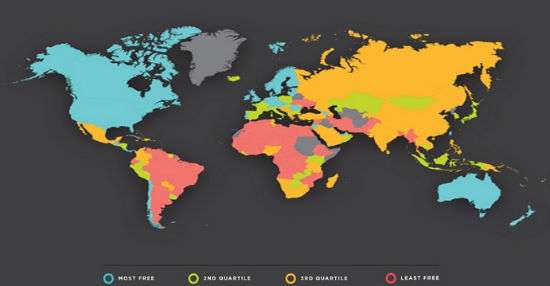Economic Freedom in the World Is Increasing
The United States ranks 16th in the world on economic freedom index

Economic freedom has been increasing around the world during the last 30 years according to the Fraser Institute's Economic Freedom of the World 2016 Annual Report. Using data from 2014, the Canadian free-market think tank creates its economic freedom index using a ten-point scale that measures the degree of economic freedom in five broad areas; (1) size of government: expenditures, taxes, and enterprises; (2) legal structure and security of property rights; (3) access to sound money; (4) freedom to trade internationally; and (5) regulation of credit, labor, and business.
The good news, according to the 2016 report is that "economic freedom has increased throughout the world during the past three decades. The average EFW rating of the 20 high-income countries was 0.8 units higher in 2014 than 1985 and that of the 89 developing economies, 1.7 units higher." Between 1985 and 2014, economic freedom among high-income countries rose from 6.9 to 7.7 points; among developing countries economic freedom increased from 5.0 to 6.7 points. To consider how bad things used to be, by 2014 only four developing countries remained below the 5.0 point average of 1985 - Argentina, Congo, Libya, and Venezuela.
The report notes that the top-ten countries are Hong Kong and Singapore, that once again, occupy the top two positions. The other nations in the top 10 are New Zealand, Switzerland, Canada, Georgia, Ireland, Mauritius, the United Arab Emirates, and Australia and the United Kingdom, tied for 10th. The researchers report the rankings of some other major countries: the United States (16th), Germany (30th), Japan (40th), South Korea (42nd), France (57th), Italy (69th), Mexico (88th), Russia (102nd), India (112th), China (113th) and Brazil (124th).
The bottom ten least economically-free (otherwise known as basket-cases) are Iran, Algeria, Chad, Guinea, Angola, the Central African Republic, Argentina, the Republic of the Congo, Libya and, lastly, Venezuela. Glancing at the map below will tell you that the folks a Fraser did not evaluate places like Sudan, South Sudan, Somalia, Afghanistan, Tajikistan, etc. - which suggests there is a level below basket-cases. Let's call that the hellhole level.
Additionally, the report notes that nations that are economically free out-perform non-free nations in indicators of well-being. Nations in the top quartile of economic freedom had an average per-capita GDP of $41,228 in 2014, compared to $5,471 for bottom quartile nations (PPP constant 2011 US$). In addition, life expectancy is 80.4 years in the top quartile compared to 64.0 years in the bottom quartile.



Show Comments (81)